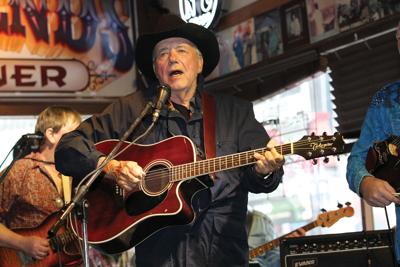Although he’s usually identified with country classics like “Detroit City” and “The Streets of Baltimore,” Bobby Bare explores the genre’s themes without sounding exactly like a country singer — the stereotypical idea of one, anyway. In the 1960s in Nashville, Bare’s versions of songs by Nashville songwriters like Tom T. Hall and Harlan Howard communicated the physical and psychic dislocation that came with the modernization of the South. Bare’s humane baritone floated over countrypolitan arrangements that filtered folk music through the Nashville approach to studio recording.
Bare was born in Ironton, Ohio, on April 7, 1935, and first hit the charts with the 1958 rock ’n’ roll single “The All American Boy,” credited on the record to Bill Parsons. He is, among other things, one of the essential figures in the group of Nashville musicians called the Outlaws. April 7 marks the beginning of a series of shows featuring a set of musicians who will pay tribute to the great singer on his 90th birthday. His son and fellow musician Bobby Bare Jr. has organized the weeklong celebration, with appearances by acolytes like Lucinda Williams, Mary Gauthier and Buddy Miller. The week kicks off with a show on Bare’s birthday at The Basement East, followed by events at The Bluebird Cafe, the Grand Ole Opry House and the Country Music Hall of Fame and Museum.
“We’re gonna create a livestream for him and my mom in Hendersonville,” says Bare Jr. about the April 7 show, noting it’s unlikely his father will make it out to the events in person. Meanwhile, April 12’s in-the-round show at the Hall of Fame features Bare Jr., Todd Snider and producer and songwriter Buddy Cannon, a longtime friend of the Bare family.
Cannon, who grew up in Lexington, Tenn., has a résumé that includes an early-’70s stint playing bass with singer Bob Luman and working as a songwriter and song plugger for Mel Tillis. His songwriting credits include co-writing Vern Gosdin’s 1988 hit “Set ’Em Up Joe.” Cannon, who now lives outside Nashville, recalls meeting Bare in Chicago in 1968 or 1969.
“My most vivid memory about those early days being around Bobby was, one of the disc jockeys from [Chicago radio station] WJJD called the club where we were playing, and it was snowing like crazy outside,” Cannon says. “He told [the club] he had a couple of friends who were stranded at O’Hare and were looking for something to do. So we’re up there playing and the door opens, and in walks Bobby Bare and Tom T. Hall. Bobby wanted to sing, and Tom T. just wanted to look out the window.”
Cannon says he’ll sing Tillis and Danny Dill’s 1963 song “Detroit City” at the Hall of Fame. As he tells me, “They want me to do that one because of the Tillis connection.” Bare’s 1966 take remains definitive — “Detroit City” is about missing the lay of the land, which the city obliterates.
Bare got deeper into the theme of dislocation on his 1967 album A Bird Named Yesterday. In a year that saw The Beatles write about childhood memories on Sgt. Pepper’s Lonely Heart Club Band, Bare’s concept album looked at the destruction of rural values. A Bird decries urban renewal, chemical waste and interstate highways, and it also sports a Cowboy Jack Clement song about air conditioners.
Bare’s late-’60s albums mix folk guitars with layers of background singers. His 1973 album of Shel Silverstein songs, Bobby Bare Sings Lullabys, Legends and Lies,peaks with “Sure Hit Songwriters Pen,” about a hack writer who uses magic to succeed. I also love 1975’s Cowboys and Daddys, on which Bare finesses tunes by Hall, Terry Allen and Dave Hickey. As Cannon tells me, Bare’s passion for the perfect song has helped define a great career in music.
“He loved great songs so much,” Cannon says. “I think he probably just kept his door unlocked. I can’t imagine a songwriter coming to Bobby Bare’s door and him not letting him in.”








